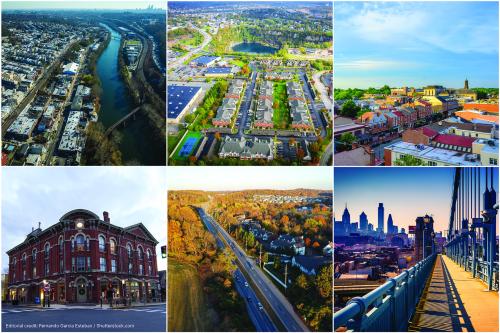Make communities unique; offer a vibrant mix of retail, housing, transportation and job choices
America’s cities are entering a period of enormous potential and opportunity. Broad demographic forces and rapid economic changes are repositioning U.S. metropolitan areas as the engines of national prosperity, and revaluing the assets and attributes of central cities.
A growing and diverse population means people demand greater choices in where they live. An economy based on knowledge and innovation bestows new importance on densely configured urban places (where ideas are transferred easily from firm to firm) as well as institutions of knowledge. This is particularly true of universities and medical research centers, many of which are located in the heart of central cities and urban communities.
A world undergoing climate change demands new sustainable approaches to human settlement.
Riverside’s status as one of the most livable communities in the country owes a great deal to its cultural institutions, distinctive parks and walkable downtown. And by offering a vibrant mix of retail, housing, transportation and employment choices, cities such as Riverside are better able to meet the needs of a diverse population.
In short, American prosperity depends on the prosperity of our cities and metropolitan areas. And delivering the promise of broad-based economic prosperity requires that cities grow in inclusive ways by reducing poverty and promoting a strong, resilient and diverse middle class.
First and foremost, cities need to fix the basics. Good schools, safe streets and the efficient delivery of municipal services are the fundamentals that guide the location decisions of businesses and families. Getting the basics right must begin by creating responsive and accountable local regional government.
Recognizing that economic growth, job creation and quality of life depend on the provision of good public services, Fort Wayne, Ind., has adopted corporate-style performance and accountability standards for all city operations.
Mayor Graham Richard has cut the response time for fixing potholes by 86 percent and slashed the waiting time for building permits from 51 days to 12 days, generating more than $10 million in cost savings over the past five years. That money is now being invested in work force development programs and a metropolitan-wide high-speed broadband network.
Second, cities and metropolitan regions need to embrace the qualities (complexity, density, diversity) that make cities unique. Unfortunately, our settlement patterns— sprawling metropolitan areas where residential communities are separated from commercial, retail and industrial areas— undermine these qualities.
By promoting denser, more responsible growth patterns, cities and metropolitan areas can realize much higher returns on infrastructure investments. Competitive cities are investing in new transit systems and the accompanying opportunities for transit-oriented development.
Denver is currently building a 137-mile, $4.7 billion regional transit system, creating opportunities for dense development along rail corridors, and offering residents new choices in where they live, work and play.
Finally, cities must organize themselves for success by taking aggressive steps to assemble disparate stakeholders around shared goals. In cities and metropolitan areas across the country, major institutions and interests are fragmented, preventing action on pressing issues such as congestion, affordable housing and air quality.
Success will require business, civic and elected leaders to engage with each other in a sustained way, coordinating their efforts on major challenges and engaging metropolitan residents in the process. Few such entities have been as successful in organizing multiple constituencies behind a unified metropolitan economic strategy as Greater Louisville Inc.
A business-led civic organization, Greater Louisville, Inc. has rallied the corporate and civic resources of the Louisville, Ky., area and provided the political leadership needed to overcome political barriers to coordination, making Louisville a competitive hub in the U.S. economy.
Our cities have incredible potential to deliver robust, sustainable and inclusive growth and broad-based prosperity over the coming decades. At the end of the day, though, cities cannot go it alone.
American cities should demand a federal partnership that recognizes the economic primacy of our metropolitan areas and fully leverages the economic potential of our major urban centers.
What’s needed is a fundamental shift in philosophy at the federal level — from deficits to assets, from market-distorting programs to market-shaping investments. Achieving the aims of a prosperous, environmentally and socially sustainable 21st century will require nothing less.
The Brookings Institution is committed to quality, independence, and impact.
We are supported by a diverse array of funders. In line with our values and policies, each Brookings publication represents the sole views of its author(s).



Commentary
Op-edElevate Our Cities
May 13, 2007